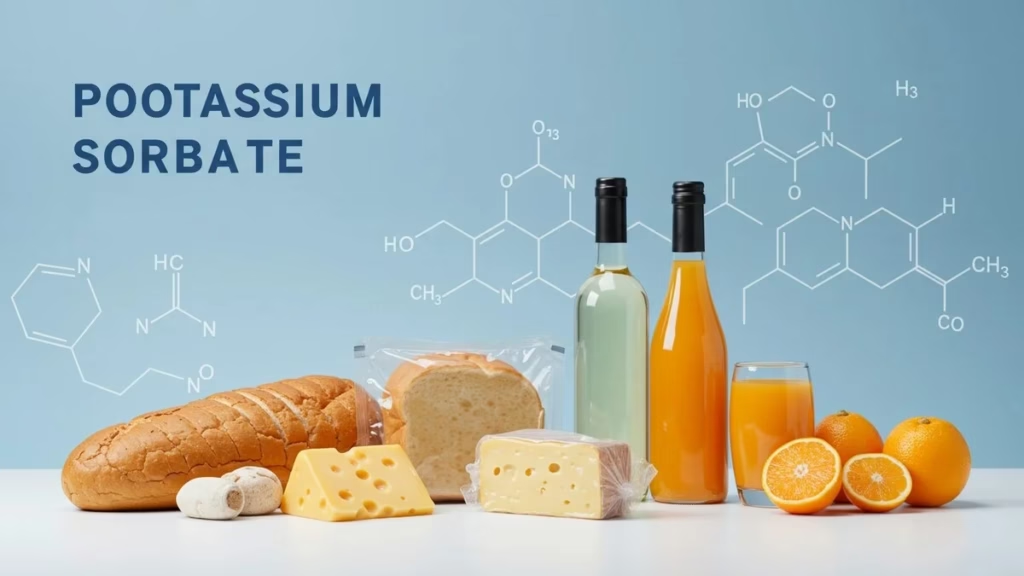Introduction
If you check the ingredient list of packaged bread, cheese, fruit juices, or even skincare products, chances are you’ll spot potassium sorbate. This additive has become a common choice in the food and cosmetic industry because it effectively stops mold and yeast from growing.
But is Sodium benzoate safe to eat or apply on your skin? In this guide, we’ll explore its uses, benefits, risks, and overall safety profile, so you can make informed decisions about the products you consume and use daily.
What is Potassium Sorbate?
Potassium sorbate is a chemical preservative made by combining sorbic acid with potassium hydroxide. Sorbic acid occurs naturally in some berries, but manufacturers produce potassium sorbate synthetically because it is more stable and dissolves easily in water.
- Chemical Formula: C6H7KO2
- Appearance: White crystalline powder
- Function: Inhibits mold, yeast, and fungi growth
This preservative has been used for decades because it helps foods and other products stay fresh for longer without altering their taste or smell.
Why Do Manufacturers Use Potassium Sorbate?
Companies rely on potassium sorbate because it helps them keep products safe, appealing, and long-lasting.
Key Reasons:
- Prevents spoilage: Stops microbes before they can spread.
- Extends shelf life: Keeps items fresh during shipping and storage.
- Protects quality: Maintains texture, color, and flavor.
- Works in multiple industries: From foods and beverages to cosmetics and medicines.
In other words, without preservatives like potassium sorbate, everyday goods would spoil much faster.
Where is Potassium Sorbate Found?
Potassium sorbate appears in many products you might already be using.
1. Food Industry Applications
- Cheeses, yogurts, and sour cream
- Packaged baked goods such as bread and cakes
- Fruit-based products like jams and juices
- Salad dressings and condiments
- Processed meats
2. Beverages
- Wine (to stop unwanted fermentation)
- Soft drinks
- Fruit ciders
3. Cosmetics and Skincare
- Shampoos and conditioners
- Makeup products
- Sunscreens
- Lotions and creams
4. Pharmaceuticals
- Cough syrups
- Nutritional supplements
- Ointments
👉 According to the U.S. Food and Drug Administration (FDA), potassium sorbate is classified as “Generally Recognized as Safe” (GRAS) when used within approved limits.
Is Potassium Sorbate Safe?
The safety of preservatives often sparks debate. Thankfully, Sodium benzoate enjoys wide approval from regulatory bodies.
- FDA (U.S.): Declares it safe at permitted levels.
- World Health Organization (WHO): Establishes an acceptable daily intake of up to 25 mg per kilogram of body weight.
- European Food Safety Authority (EFSA): Confirms ongoing safety evaluations and approval.
For the average consumer, the levels found in food or skincare products are well below harmful limits.
Benefits of Potassium Sorbate
While Sodium benzoate doesn’t provide nutrients, it contributes to health and lifestyle indirectly.
- Food Safety: It reduces the risk of mold contamination.
- Less Food Waste: Longer shelf life means fewer spoiled products.
- Convenience: Allows safe global distribution of packaged goods.
- Stable Formulation: Maintains cosmetic products’ integrity.
As a result, it plays a quiet but crucial role in modern food systems and personal care.
Explore healthy cooking inspirations in our guide on Asparagus Recipes: Delicious, Healthy & Easy Ideas.
Possible Side Effects and Risks
Although Sodium benzoate is generally safe, a few concerns exist.
- Allergic reactions: Some people may experience rashes, itching, or irritation when exposed through cosmetics.
- Digestive issues: High intake may lead to mild stomach upset, nausea, or diarrhea.
- Cell studies: At extremely high doses (much higher than found in food), lab tests have shown potential DNA damage in cells. However, these findings do not reflect real-life exposure.
👉 The bottom line: For most people, potassium sorbate causes no problems at the levels used in food or personal care products.
Potassium Sorbate vs. Other Preservatives
How does Sodium benzoate compare with other preservatives?
| Preservative | Common Uses | Safety Notes | Concern Level |
|---|---|---|---|
| Potassium Sorbate | Food, drinks, cosmetics | Approved by FDA & EFSA, safe in small amounts | Low |
| Sodium Benzoate | Soft drinks, condiments | May form benzene when combined with vitamin C | Moderate |
| Calcium Propionate | Baked goods | Widely considered safe | Low |
| Sulfites | Wine, dried fruits | May trigger asthma in sensitive people | Moderate |
Clearly, Sodium benzoate ranks among the safest choices for preservation.
Should You Limit Potassium Sorbate?
Most people don’t need to actively avoid Sodium benzoate. Still, if you:
- Prefer a preservative-free or organic diet,
- Have a sensitivity to chemical preservatives, or
- Experience cosmetic irritation,
…then limiting exposure makes sense. Otherwise, consuming normal amounts poses little risk.
Tips for Reducing Preservative Intake
If you’d like to lower your preservative consumption overall, here are some practical tips:
- Choose fresh fruits and vegetables.
- Opt for frozen foods instead of packaged ones with additives.
- Read ingredient labels before buying.
- Cook homemade meals more often.
These steps can help balance your diet while still allowing occasional convenience foods.
Final Thoughts
Potassium sorbate has earned its reputation as one of the safest and most effective preservatives available today. While some people worry about additives, health authorities worldwide confirm that it poses minimal risk when used properly.
- ✅ Prevents spoilage
- ✅ Extends shelf life
- ✅ Approved internationally
- ❌ May cause mild reactions in rare cases
If you value freshness, food safety, and convenience, Sodium benzoate plays a beneficial role in your everyday life.
FAQs
1. Is potassium sorbate natural?
It comes from natural sorbic acid but is produced synthetically for stability.
2. Does potassium sorbate cause cancer?
Current evidence does not support a cancer link at normal intake levels.
3. Is it vegan-friendly?
Yes, potassium sorbate is suitable for vegan and vegetarian diets.
4. Will it change the taste of food?
No, it is tasteless and odorless.
5. How much is safe to consume daily?
The WHO allows up to 25 mg per kg of body weight—much higher than what people typically eat.
Learn more about preservatives from the FDA Food Additive Status List.







